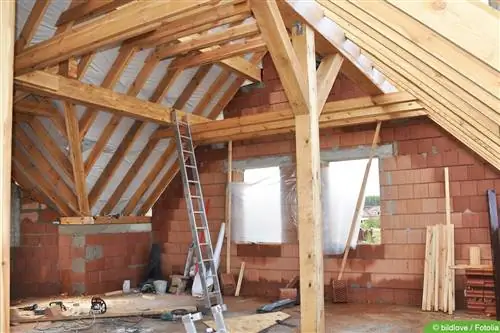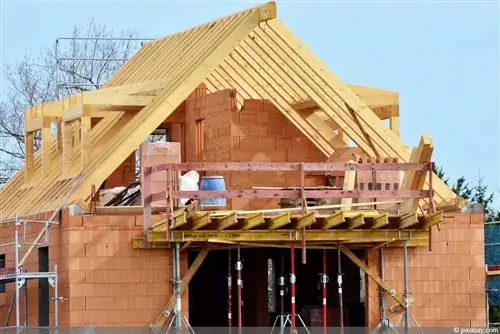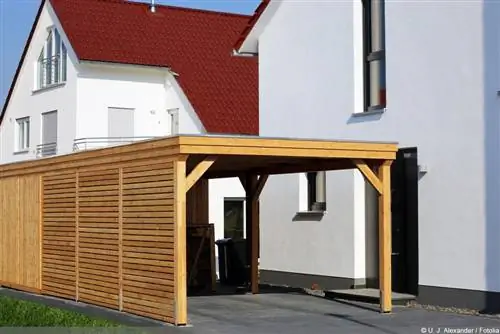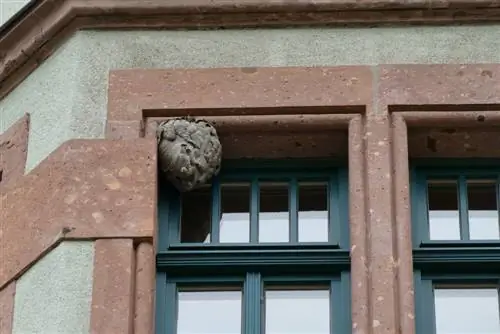- Author admin caroline@plants-knowledge.com.
- Public 2023-12-17 03:39.
- Last modified 2025-01-24 12:45.
If roof formwork has to be installed, one of the questions that arises is the right materials. Both OSB and splint are suitable for the attic.
What is OSB?
The abbreviation stands for “OrientedStrandBoard”, which in German roughly means “board made of aligned wood shavings”. Coarse chipboard is also a synonym for it.
The wood shavings are aligned in one direction and connected to each other using pressure and glue. This creates a light and easy-to-machine material that is suitable for numerous applications. The material is often used, especially when building houses.
Advantages
There are several advantages to chipboard. These include, among others:
- appealing appearance
- light weight
- great bending strength
- easy to edit
- only slightly permeable to water vapor
- stable
- wearing
- comparatively low price
The material does little work and can therefore have a long service life as roof formwork.
Potential disadvantages
Due to the large amount of glue required for the necessary treatment, the material is unfortunately not particularly environmentally friendly. As a result, they also emit substances that are harmful to he alth, which require some protective measures during processing.
When used in a rarely used attic, this plays a minor role. However, if this is to be expanded and used as a hobby room, for example, this property can pose a serious problem.
Necessary protective measures
When working with OSB boards, it is crucial that you wear appropriate protective clothing. These include:
- strong work gloves
- Mouth and nose protection
- Safety glasses
Because the fumes or substances hazardous to he alth are released in large quantities during sawing, grinding and drilling.
Note:
Ventilate the room well before, during and after processing or carry out the work directly outdoors. Also remove any wood residue and sawdust afterwards.
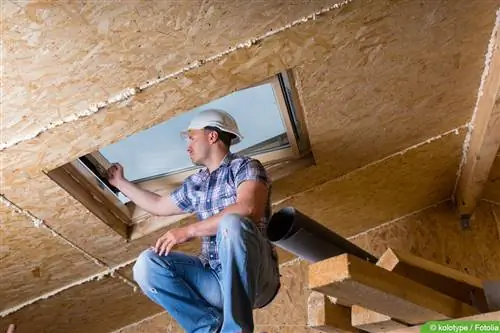
What is Rauspund?
These are boards that are planed or leveled on one side. They have tongue and groove on the long sides so that they can be easily connected to each other. They are usually made of softwood such as fir or spruce, which produces a pleasant smell.
Advantages
The advantages of sheet piling as roof formwork include:
- easy to edit
- free from chemical treatment
- no risk to he alth
- environmentally friendly raw material
- has a positive effect on the indoor climate
They are therefore particularly suitable if the attic is to be converted and used regularly as a living space or work area.
Note:
When drilling, sawing and sanding, protective clothing should still be worn and well ventilated. Because the dust can irritate both the respiratory tract and the eyes.
Potential disadvantages
In addition to the advantages, sheet pilings also have some potential disadvantages. For example:
- reworks
- more complex processing
- more time required for laying
The individual elements have greater residual moisture than chipboard and can therefore warp. The service life therefore depends on the affecting factors, such as:
- Moisture
- Insulation
- Heat or temperature fluctuations
However, under optimal conditions, the boards are durable and long-lasting. However, they represent a challenge in terms of costs and the effort required.
Cost comparison
One square meter of OSB costs around seven to eleven euros to purchase. The panels can be easily processed yourself, which means that follow-up costs can be kept extremely low. With Rauspund, you should budget around eleven to 30 euros per square meter for the material alone. But there are also other expenses. These include, among others:
- Spacers
- Profile claws
- Screws
It is possible for laypeople to install the roof boarding themselves. However, it is tiring, tedious and requires the necessary knowledge. If a company is commissioned to do this, a large number of working hours must be expected.
Especially when used as a living space, these expenses are worth it, even visually.

